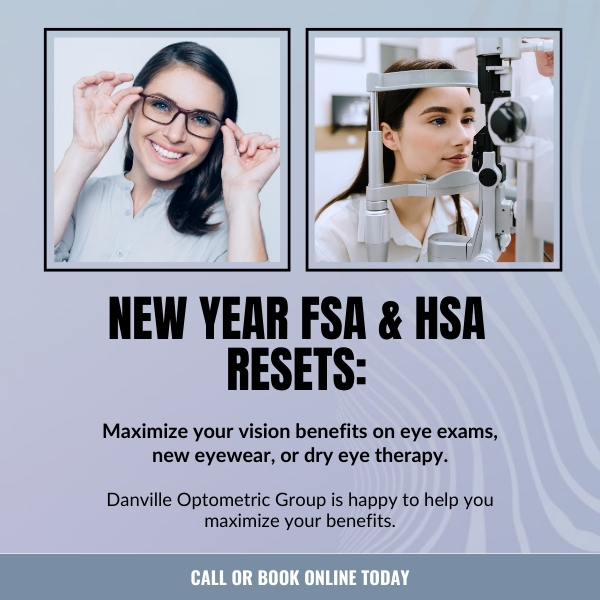Dry eyes are more than just an uncomfortable inconvenience—they’re a condition that affects millions of people worldwide. Causes of dry eyes range from allergies to medical conditions or age, and research even indicates that unmanaged stress can cause dry eyes. As varied as the causes of dry eyes are, so are their potential treatments.
For example, lubricating eye drops may be enough for minor cases due to a dry climate. Whereas, if stress leads to dry eyes, an individual should address their stress triggers and incorporate other at-home remedies. You should seek the advice of your eye doctor for a tailored treatment plan if you’re experiencing persistent dry eye symptoms.
Understanding Dry Eye Syndrome
Dry eye syndrome, often called dry eye, occurs when the eyes don’t produce enough tears or the right quality of tears to keep them lubricated. Understanding dry eye is essential because it can significantly impact one’s quality of life.
Causes & Risk Factors for Dry Eye
Dry eye can result from various factors, from environmental conditions to underlying medical issues. Common causes and risk factors include:
- Age
- Environmental factors
- Screen time
- Medical conditions
- Medications
Understanding dry eye syndrome’s causes and risk factors can help you identify potential triggers and make informed decisions about managing the condition.
Symptoms & Impact on Daily Life
Dry eye manifests through various symptoms ranging from mild to severe. Common symptoms include:
- Irritation and redness
- Burning sensation
- Blurry vision
- Sensitivity to light
- Excessive tearing
- Feeling like there’s something in your eye
These symptoms can significantly impact daily activities like reading, driving, or working on a computer. Promptly addressing them is essential for maintaining eye health and overall quality of life.
How Stress Impacts the Body
Stress triggers a cascade of physiological responses in the body, often called the “fight or flight” response. While this reaction is designed to help us handle immediate threats, chronic stress can lead to a variety of health issues.
When under stress, the body releases hormones like cortisol and adrenaline. These hormones can cause inflammation, disrupt normal bodily functions, and weaken the immune system. Over time, these physiological changes can affect various parts of the body, including the eyes.
Stress & Its Role in Disrupting the Tear Film
Chronic stress can disrupt the tear film in several ways. First, stress-induced inflammation can decrease tear production, leading to a thinner aqueous layer. This reduction in tear production can make your eyes feel dry and uncomfortable. Stress can also exacerbate existing conditions such as allergies or blepharitis, further disrupting the tear film.
Practical Tips for Managing Stress & Preventing Dry Eyes
If your dry eyes result from stress in your life, the following practical tips may help.
Practice Mindfulness & Relaxation Techniques
Mindfulness and relaxation exercises, such as meditation, deep breathing, and yoga, can help reduce stress levels. Incorporating these practices into your daily routine can reduce stress and positively impact your overall health, including your eye health.
Maintain a Healthy Diet
A well-balanced diet rich in omega-3 fatty acids can support eye health and reduce inflammation. Foods like salmon, flaxseeds, and walnuts are excellent sources of omega-3s. Staying hydrated by drinking plenty of water is also crucial for maintaining a healthy tear film.
Get Regular Exercise
Regular physical activity is a proven stress reliever. Exercise can reduce cortisol levels and increase the production of endorphins, which are natural mood lifters. Activities like walking, swimming, or even dancing can help you unwind and improve your overall well-being.
Establish a Sleep Routine
Quality sleep is essential for managing stress and maintaining overall health. Aim for 7-9 hours of sleep each night and establish a consistent sleep routine. Avoid screens before bedtime, as the blue light emitted can interfere with your ability to fall asleep.
Use Artificial Tears & Eye Drops
Over-the-counter artificial tears and lubricating eye drops can temporarily relieve occasional dry eye symptoms. Look for preservative-free options to avoid potential irritation. Use these products as directed to keep your eyes moist and comfortable.
Create a Stress-Free Work Environment
If you spend long hours in front of a computer, ensure your workspace is ergonomic and take regular breaks. The 20-20-20 rule is a helpful guideline—every 20 minutes, look at something 20 feet away for at least 20 seconds. This practice can reduce eye strain and prevent dry eyes.
Discuss Your Dry Eyes with Your Eye Doctor
Managing stress is not just about improving your mental well-being—it also plays a vital role in maintaining your physical health, including your eye health. By understanding the connection between stress and dry eyes, you can take proactive steps to address both issues.
Remember, a holistic approach that includes stress management, a healthy lifestyle, and proper eye care can make a significant difference. Call our team at Danville Optometric Group if you’re experiencing persistent dry eye symptoms. Take charge of your health today, and schedule an appointment with one of our expert eye doctors.













